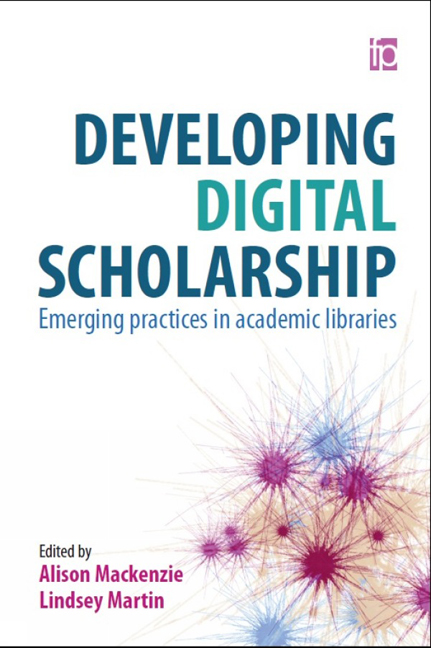Book contents
- Frontmatter
- Contents
- List of figures, tables and case studies
- Editors and contributors
- Introduction
- PART 1 A review of the landscape
- PART 2 The agile librarian
- PART 3 Digital spaces and services
- 6 Digital scholarship centres: converging space and expertise
- 7 Building scalable and sustainable services for researchers
- PART 4 Communications and social networking
- Index
7 - Building scalable and sustainable services for researchers
from PART 3 - Digital spaces and services
Published online by Cambridge University Press: 08 June 2018
- Frontmatter
- Contents
- List of figures, tables and case studies
- Editors and contributors
- Introduction
- PART 1 A review of the landscape
- PART 2 The agile librarian
- PART 3 Digital spaces and services
- 6 Digital scholarship centres: converging space and expertise
- 7 Building scalable and sustainable services for researchers
- PART 4 Communications and social networking
- Index
Summary
Introduction
The role of the library in support of research is changing. Lorcan Dempsey (2010) has traced the shift in focus away from outside-in resources, where the library is buying or licensing materials, to ‘inside-out’ resources that may be unique to an institution. This has led to the library supporting creation, not just consumption, of scholarly outputs.
This is reflected in the new roles and services libraries are developing around digital scholarship. Weller (2011, 41) identifies different flavours of digital scholarship; one ‘refers to the curation and collection of digital resources, which places it in the information sciences, whereas others use it in a broader sense to cover a range of scholarly activities afforded by new technologies’.
This chapter explores the background to the development of these new roles and services and looks at how libraries are supporting different flavours of digital scholarship, using examples from the University of Salford in the UK and other academic and national libraries. It examines scholarly communication initiatives; research data services; digitization, curation and preservation activities; consultancy and training. The relationship of the library with faculty and other support services is considered, as are the challenges in developing new roles and services that enable the library to become a partner in digital scholarship.
Background
Liu and Thomas (2012) state that we
are in the first phase of a digital revolution in higher education. Much of the teaching and learning apparatus has moved online. Computational technologies and methodologies have transformed research practices in every discipline, leading to exciting discoveries and tools. New interdisciplinary initiatives, exploiting the digital, such as bioinformatics, human cognition, and digital humanities, are bringing faculty members together in ways never before attempted.
The key drivers behind this change are the digitization of content and the development a global, social network (Weller, 2011). The internet has removed barriers to communication and collaboration and enabled the development of new tools and techniques to interrogate the abundance of scholarly information and knowledge that is now available online.
- Type
- Chapter
- Information
- Developing Digital ScholarshipEmerging practices in academic libraries, pp. 121 - 138Publisher: FacetPrint publication year: 2016
- 1
- Cited by



